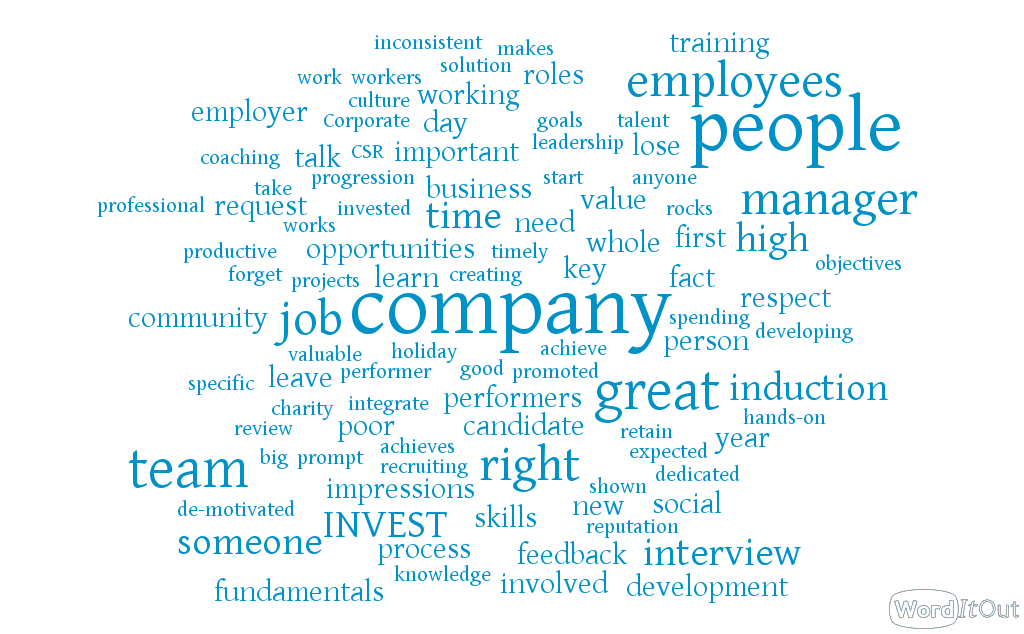Managing the Relationship Between High Performers and Your Company
- By Sarah Wilkinson
- •
- 15 Aug, 2017

How do you retain high performers?
It’s so much more than what you’re paying them. It comes down to your employer brand; and by that, I mean the whole experience someone has, right from the moment they see your advert. In fact, even before that point, as your reputation will be the basis of their first impressions.
First impressions are important. Just as you wouldn’t expect someone to turn up late to interview with you, don’t keep them hanging around either. Be prompt, and be professional. Remember that an interview is a two-way process, and as much a chance for the candidate to learn about the company as it is for you to learn about them.
The interview is a great time to let the candidate know how much you value your employees. Talk to them about the induction, opportunities for learning and development and progression within the company. Talk about the social side of the company, the benefits you offer, and the charitable causes that you support.
Corporate Social Responsibility (CSR) is a big thing. What do you do to give back to the community? Do you raise money for charity, allow a certain number of days off each year for volunteering, do you get involved in community or environmental projects?
All of this stuff is REALLY important… but there’s one thing that I haven’t yet mentioned. And that’s your managers. All too often, people are promoted into line management roles when in actual fact, whilst they might be technically great at their job, they’re rubbish at managing people. Making sure you’ve got the right people in people management roles is one of the key fundamentals in retaining your high performers. What are your managers' people management skills like? If they’re not up to scratch, their team will become de-motivated, less productive, and then they will leave. Which means that you will be losing key talent, and valuable knowledge of the company. Not to mention the cost of recruiting a backfill. And the time it will then take for that person to get up to speed.
Having a poor people manager means you’ll be creating a culture that actually works against what you’re trying to achieve as a company. Employees will lose respect for their manager, and lose respect for you as an employer.
Did you know that 1 in 4 UK managers are rated as 'poor' by their employees? Make sure you have got the right kind of training / development offering for people managers. An off the shelf solution won’t work here. Make sure they know what’s expected of them, and that they are equipped with the basic management fundamentals. Whether it’s having difficult conversations, declining a holiday request, holding a sickness review meeting, responding to a flexible working request or giving feedback to their team.
Did you also know that research has shown that over 58% of employees have looked elsewhere for a job because of their managers, and that a third of workers have faked sick days. Compared to only 10% for those with good managers.
Managers have a pivotal role in how your company achieves its goals. This means that developing their leadership and management skills are critical.
Many years ago, my Grampy once said to me that ‘It’s far worse to have a bad manager, but a great job, than to have a great manager, but a bad job’. And do you know, I really think he’s right. If you’re spending every day with someone who is disrespectful to you, inconsistent in their approach and doesn’t value what you do; let alone provide you with specific objectives and timely feedback and coaching, then this is not the sort of company that anyone, least of all a high performer, is going to want to be invested in. Show them recognition. Value them.
So, when your new employee rocks up for their induction on day one, give them a GREAT induction. One they won’t forget. One that makes them think ‘Wow!’. Make it hands-on, let them get involved with other areas of the business; let them put the jigsaw pieces together. And then? DON’T JUST LEAVE THEM TO GET ON WITH IT!!
Managers need to spend dedicated time with their new team member, and integrate them into the team. As a company, you need to keep them motivated and engaged, giving them a company they will love working for. If you don’t, I give it 6 months... a year max, before that person leaves and you will have to start the whole recruitment and induction process all over again.
Invest in your employees. Invest in your managers. Invest in your business.
